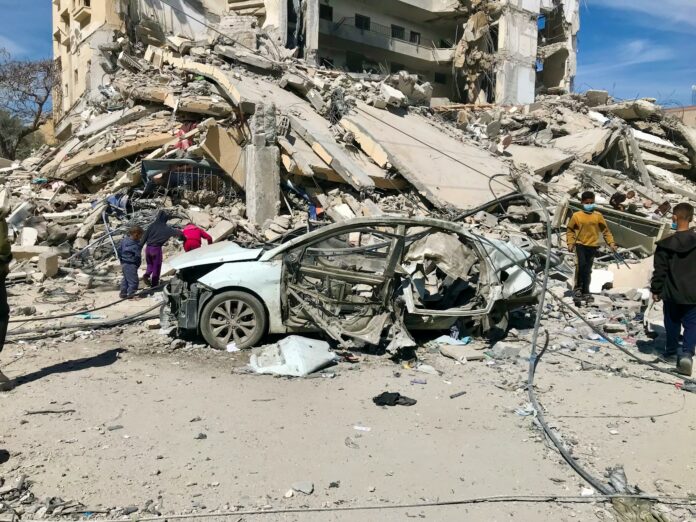Hamas and Palestinian Islamic Jihad submit a response to the ceasefire plan, urging an end to aggression in Gaza
Hamas has officially responded to a US-backed ceasefire proposal, emphasizing the need for a permanent halt to the ongoing conflict in Gaza. A senior Hamas official confirmed to the BBC that their acceptance hinges on Israel’s commitment to a lasting ceasefire. The joint statement from Hamas and Palestinian Islamic Jihad (PIJ) expressed their willingness to positively engage in reaching a comprehensive deal.
The proposed ceasefire plan, endorsed by the UN Security Council, outlines an initial six-week cessation of hostilities, with the goal of transitioning to a permanent peace agreement. Mediators Qatar and Egypt, along with the US, have played crucial roles in facilitating these negotiations.
In their statement, Hamas and PIJ highlighted the importance of ending the aggression against Gaza, stating, “The response prioritizes the interests of our Palestinian people and emphasizes the necessity of a complete halt to the ongoing aggression on Gaza.” They reiterated their readiness to engage in negotiations to achieve a peaceful resolution.
White House national security spokesperson John Kirby acknowledged Hamas’s response, noting that US officials are currently evaluating their requests. Secretary of State Antony Blinken, who recently met with Israeli Prime Minister Benjamin Netanyahu, stated that Netanyahu had reaffirmed his commitment to the ceasefire plan and awaited Hamas’s official reply.
President Biden’s proposal, announced last month, involves a phased approach: an initial six-week ceasefire, followed by the release of hostages by Hamas in exchange for the release of Palestinian prisoners by Israel. The second phase would see the remaining hostages freed and a total withdrawal of Israeli forces from Gaza, leading to a permanent ceasefire subject to further negotiations.
While Netanyahu’s war cabinet has authorized the plan, the Prime Minister faces internal political pressure. Far-right members of his coalition have threatened to withdraw their support, potentially collapsing the government if the ceasefire deal proceeds.
During Blinken’s visit to Tel Aviv, protesters outside his hotel, many holding American flags and pictures of hostages, called for an agreement. Vicki Cohen, whose son Nimrod was kidnapped by Hamas on October 7, pleaded for US intervention to pressure the Israeli government into action.
Blinken also attended a conference of Arab leaders at the Dead Sea, advocating for increased aid access to Gaza. He announced $404 million in new aid for Palestinians and urged other nations to contribute to the humanitarian effort.
The conflict, which began on October 7 with a Hamas attack on Israel resulting in 1,200 deaths and 251 hostages taken to Gaza, has seen significant casualties. The Hamas-run health ministry in Gaza reports over 37,000 deaths since the Israeli offensive began.
Analysis:
Political Impact:
The ceasefire proposal and subsequent negotiations signify a critical juncture in the Israel-Hamas conflict. A successful ceasefire could stabilize the region and provide a framework for long-term peace. However, the internal political dynamics in Israel, with Netanyahu facing opposition from far-right coalition members, complicate the implementation of the agreement. The international community’s involvement, particularly the US’s role, underscores the global stakes in achieving a resolution.
Social Reflection:
The public reaction to the ceasefire negotiations reflects the deep divisions within Israeli and Palestinian societies. The protests in Tel Aviv highlight the desperation of families seeking the return of their loved ones, while the broader societal debate underscores the complex emotions and political allegiances at play. The conflict’s human toll and the call for international intervention illustrate the profound social impact of prolonged hostilities.
Psychological Aspect:
The ongoing conflict and the high-stress environment of negotiations have significant psychological repercussions for individuals directly affected, particularly hostages and their families. The trauma of captivity and the uncertainty of rescue efforts contribute to long-term mental health challenges. For the general population, the constant threat of violence and the protracted nature of the conflict create a pervasive sense of fear and anxiety.
Sociological Angle:
Sociologically, the ceasefire negotiations highlight the entrenched divisions and the need for sustained dialogue to address the underlying causes of the conflict. The involvement of international mediators like the US, Qatar, and Egypt reflects the global recognition of the need for a multi-faceted approach to conflict resolution. The potential for a permanent ceasefire offers a glimpse of hope for rebuilding trust and fostering a more stable society in the region
